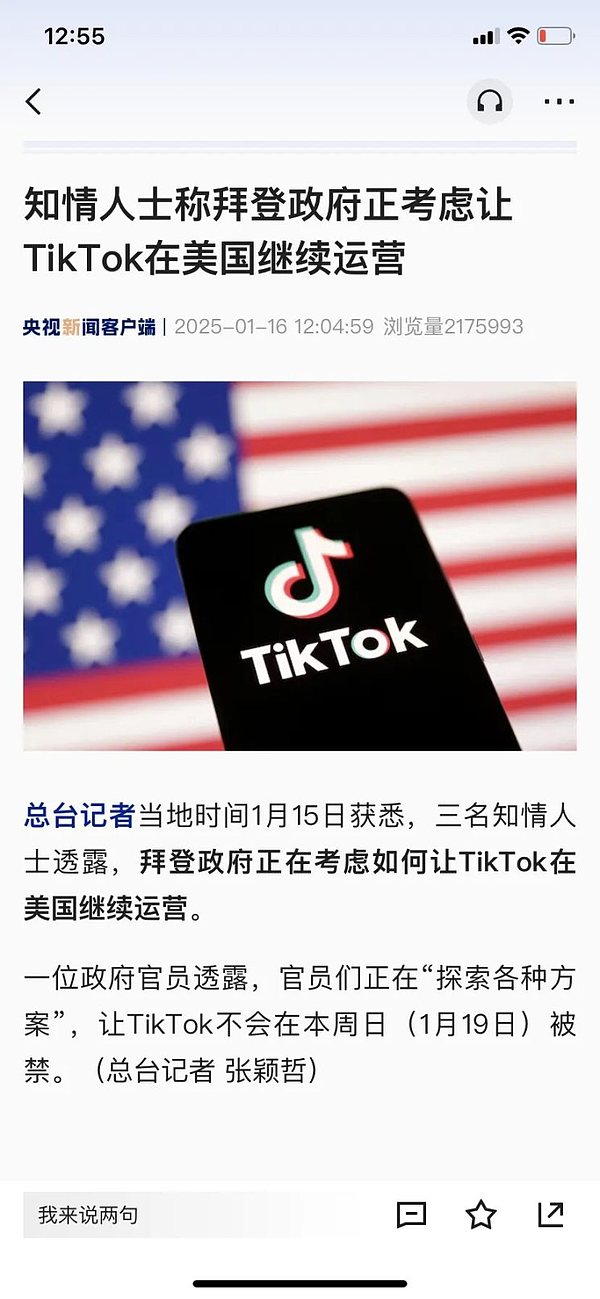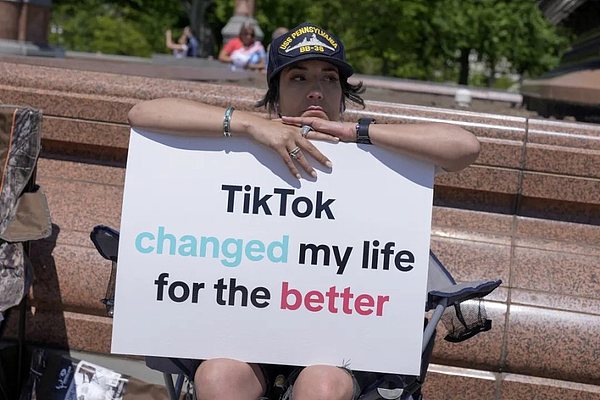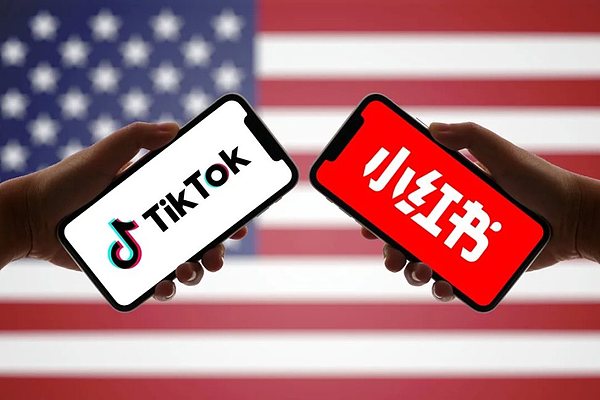This may be the first time in human business history that a company with 170 million users and a value of 100 billion US dollars has chosen to be either free or dead.
On January 15, it was reported that TikTok was preparing to shut down its services immediately in the United States on Sunday unless the Supreme Court intervened to block the "no-sell or no-ban" ban.
According to the report, according to this plan, when users try to open TikTok, they will see a pop-up message prompting them to visit a website for details of the ban. At the same time, TikTok will also provide a data download option to allow users to save their personal information.
If this move is implemented, this decision will mark that TikTok has gone from constant struggle to the point of no way out, and finally insisted on not retreating, "Life is a hero, and death is also a ghost hero."
But it seems that there is a turning point. The latest news is that according to CCTV News, people familiar with the matter revealed that the Biden administration is considering how to allow TikTok to continue operating in the United States, and "officials are 'exploring options' on how to implement the law so that TikTok will not be banned this Sunday."

Image source: CCTV News
Since the US government proposed a national security review in 2019, the pressure on TikTok has almost never stopped.
As the deadline for "no sale or ban" approaches, TikTok would rather take decisive measures to directly shut down the app and let all users face the impact of the ban. This choice will undoubtedly bring unprecedented challenges to the world's largest short video platform.
There are only 3 days left in the countdown. Regardless of whether a turnaround can appear before the last moment, TikTok's persistence has demonstrated its strong ability to withstand pressure and its firm defense of its own values.
The story of TikTok is no longer a simple narrative of how a technology company copes with political and commercial pressures. It has long become a microcosm of the complex game between countries, companies and users in the context of globalization.
Just as it was when it first emerged a few years ago, TikTok has surpassed the positioning of a short video platform and has become an important chess piece in global competition.
Now, at the moment of life and death, TikTok is obviously not simply guided by commercial interests, but has chosen a more historically significant "toughness" - a posture of not fearing power and not easily compromising. This attitude may affect the far-reaching pattern of future technology industry interactions with overseas countries.
01 TikTok has no way out
In the past two days, Xiaohongshu has been flooded with foreigners. Chinese and foreign netizens have been laughing, scolding and mingling on this app, but behind this seemingly prosperous Internet "scene", a critical moment rarely seen in business history is approaching.
A company with 170 million users and a market value of 100 billion US dollars in the United States is at an unprecedented critical juncture of life and death. This situation is probably difficult to find precedent in business history.
Last April, the US Congress passed a legislation: prohibiting or forcing the parent company ByteDance to sell TikTok. The bill was later signed into law by President Biden, marking the most severe fate for TikTok-TikTok will be banned in the United States on January 19 this year unless it breaks off relations with its Chinese parent company ByteDance.
But we know that this difficulty began in November 2019, when the US government conducted a national security review of TikTok's parent company ByteDance's acquisition of Musical.ly, focusing on the processing and storage of user data.
In the following months, the US Senate held several hearings to promote legislation to ban TikTok. In August 2020, then-President Trump signed an executive order requiring TikTok to divest its US business within 90 days and take a series of restrictive measures. Although these bans did not take effect immediately, the US Foreign Investment Committee (CFIUS) immediately launched a stricter review of TikTok.
In June 2021, although the Biden administration revoked the Trump-era ban, the relevant pressure and restrictions were actually intensified.
TikTok has tried many efforts to try to solve the problem in the past. Including the establishment of a "Transparency and Accountability Center"; the establishment of a content advisory committee; the establishment of a dedicated US Data Security Company (USDS) to manage the data of US users; the implementation of a data isolation project called "Clover" and a data security project called "Texas", both of which have an annual operating cost of approximately $1 billion; hiring executives with US backgrounds; and reaching an agreement with Oracle, Oracle will become TikTok's "trusted technology provider" in the United States. Under the agreement, Oracle has the right to conduct security checks on TikTok's source code in the United States.
Past efforts and a series of subsequent efforts by TikTok to block the proposal - including persuading users to complain to congressional representatives and running advertisements to promote TikTok's efforts in data security just days before the final vote, all ended in failure as the US Congress passed the bill.
But TikTok has not stopped its fight. Last May, TikTok and its parent company ByteDance filed a lawsuit in the U.S. federal court, asking the court to rule that the Protecting Americans from Foreign Adversaries Controlling Applications Act, which aims to ban TikTok, is unconstitutional and to overturn it.

Image source: Visual China
In September, TikTok and its creators sued the U.S. government in the U.S. Court of Appeals for the District of Columbia. TikTok and ByteDance argued that the "qualified asset divestiture" required by the bill is impossible to achieve in terms of business, technology and law, and cannot be completed within the prescribed 270 days; even if the "conditional divestiture" required by the bill is feasible in operation, it fundamentally violates the U.S. Constitution's commitment to freedom of speech and personal freedom.
In December, the U.S. Federal Court of Appeals rejected TikTok's appeal and upheld the ban requiring ByteDance to divest TikTok's U.S. business.
TikTok has fought hard all the way, and now it has no way to retreat. Perhaps only by "fighting" to the end can there be a glimmer of hope in the future.
Meanwhile, President-elect Donald Trump is reportedly considering issuing an executive order to suspend the ban for 60 to 90 days. Trump's term will begin the day after the ban takes effect, but the report did not explain how Trump intends to implement the measure legally.
In addition, last week, U.S. Senator Edward Markey of Massachusetts spoke on the Senate floor and live on TikTok. In his speech, he mentioned plans to introduce legislation to extend the deadline for TikTok's "no sale or ban" ban for another 270 days, saying that the ban will severely damage the American social and cultural ecology, millions of Americans will lose their channels of expression, and have a serious impact on those who rely on the app to establish social connections and make a living.
But the deadline is imminent, with only 3 days left in the countdown. Will there be any changes?
02 Open a window in the Chinese and American Internet worlds?
Whether to shut down directly, continue to operate, or probation and wait for Trump to take office before the trial, the ending of TikTok in the United States will be answered in 3 days.
But standing at today's time point, especially seeing the "drama" scene on Xiaohongshu, we can already start to think: After the dust settles on the survival of TikTok, where will the Chinese and American Internet worlds go.
First of all, it is certain that after TikTok was banned, Douyin opened international registration, and then the American TT users flocked to China for refuge.

Image source: Visual China
Since January 15, a large number of user videos with IP locations shown as the United States, the United Kingdom, Russia, Thailand and other places have appeared on Douyin, and the mobile phone number registration page also shows that international telephone area codes of many countries around the world are available.
However, this does not mean that Douyin has opened up overseas IP registration. ByteDance did not directly respond to whether Douyin has opened up overseas user registration, while Douyin Group's Li Liang responded on Weibo, "Having an overseas IP does not mean that it is an overseas registered user. In addition, we found that many people also took advantage of this wave to fish in troubled waters, reposting videos to impersonate foreign users, especially some black industry gangs who wanted to take the opportunity to increase fans and raise accounts. It is difficult to identify these accounts. We have been actively managing them in the past few days, and have dealt with more than 10,000 accounts that impersonate foreign users."
In other words, some of the large number of videos recorded by foreigners that currently appear in Douyin may be reposted overseas or domestic black industry teams use "fake foreigners" to attract traffic.
Even if we don't talk about the domestic and foreign regulatory issues that may be involved in foreign users registering domestic apps, it is also a huge challenge for foreign creators and users to integrate into these Chinese Internet communities after entering platforms such as Douyin and Xiaohongshu.
Obviously, Xiaohongshu is not ready for internationalization. One example is that today, Xiaohongshu APP does not have the necessary translation function for international APPs such as X, ins, and TikTok. After a large number of overseas users have poured in, cross-border communication in the comment area still relies on Chinese users speaking English or using translators. Of course, this is not a complex technical problem. With today's level of development of AI infrastructure, high-quality multilingual translation is easy to achieve. If necessary, it is not difficult for Xiaohongshu's product team to make functional updates in a short period of time.
The deeper challenge lies in how to do a good job of international user operations on these platforms dominated by domestic communities.
Today, the overseas users who come to Xiaohongshu for "refuge" are mostly initially motivated by their aversion to the ban on TikTok, and they are happy to communicate with domestic users, mostly because of the "freshness" of their first contact with real Chinese users. The characteristic of Xiaohongshu community is "sharing real life", which may be a little more refined than the real world sometimes, but for more than 95% of Chinese and American users who have never been to each other's country, this kind of communication is full of freshness.
Whether it is sharing each other's food, scenery, and pets, or helping with English homework, or playing some international memes such as "you send me the interior pictures of the F22, and I ask you for the design drawings of the sixth-generation aircraft", this kind of real communication is undoubtedly fresh for Chinese and American users.
But for the long-term user operation of a community, freshness is not enough to "keep fresh", just like after China opened visa-free stay for people from some countries, many foreigners came to China for tourism, and Xiaohongshu has now become a cyber punch-in place for some Americans.
After the freshness is over, it is important to let overseas users "live" here, use and consume content every day; let overseas creators continue to contribute and obtain commercial benefits. Xiaohongshu still needs to operate users by IP region like all overseas products have done, and further build an overseas operation and commercialization system. This is no different from what ByteDance did in the past, and it also needs to compete with similar products such as ByteDance's lemon8 and ins.
However, even if it cannot be a substitute for similar overseas products, Xiaohongshu may still use this opportunity to tap into new possibilities by playing its value in some specific scenarios and opening a window for overseas people to understand the real China.
In fact, just like the overseas student group used Xiaohongshu as a guide for studying abroad life in the past, in the communication between Xiaohongshu users at home and abroad, we can still see that in addition to being lively and fresh, it brings a lot of practical communication to both parties. For example, Chinese users provide local attractions and food guides for foreigners who want to travel to China, and authentic Europeans and Americans explain English grammar to Chinese students. This "real and useful" service to users has always been the cornerstone of Xiaohongshu's community. With this opportunity, it may also be the beginning of Xiaohongshu's international breakthrough.
In any case, the far-reaching impact of TikTok has already surpassed the scope of simple products. After January 19, all the answers will gradually be revealed, and the many challenges and opportunities caused by this will surely become an important topic for our long-term thinking in the future.
 Miyuki
Miyuki
 Miyuki
Miyuki Alex
Alex Brian
Brian Weiliang
Weiliang Miyuki
Miyuki Alex
Alex Brian
Brian Weiliang
Weiliang Miyuki
Miyuki Joy
Joy